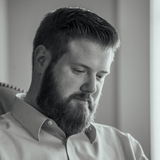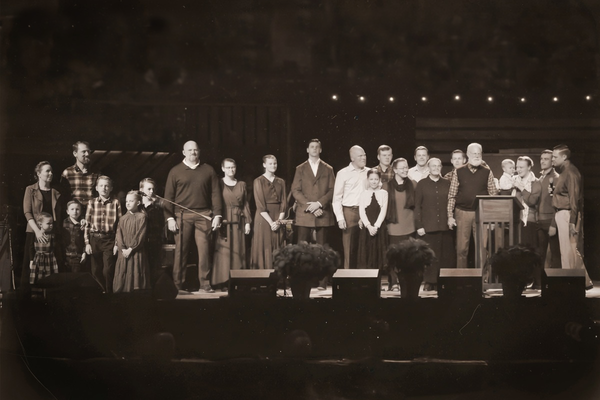“Come, Let Us Reason Together”
Faith is terrifying—it is certainty in the unseen. If truth is its source, faith becomes a conqueror. But when truth is abandoned, faith turns inward, becomes power, and finally collapses into hate. Only love, wed to truth, can stand against the spiral of deception.

The Nature of Faith
Faith is a terrifying thing—it is the certainty of things hoped for, the evidence of things not seen. And that certainty can make you powerful, even dangerous. You know you’re right, and you’re willing to bet the bank on it.
So the question is not whether we live by faith—we all do. The question is: where does our faith come from? What spawns it?
If the answer is truth—the word of God—then truth becomes the battleground, and faith the conqueror: conquering hearts, emotions, choices, devotions, whole peoples.
When Faith Loses Its Foundation
Suppose someone is ignited by a faith not rooted in the word of truth. That’s fine—because if they believe it to be truth, then come, let us reason together, and we will discover whether truth is indeed the foundation of our faith.
That process is frightening. People may lose their false faith in the process, but if they are sincere, they want to lose every false faith, everything not grounded in truth. For truth is their refuge, their covering, their strong tower. Faith is merely the internalization, the activation, of that external, ever-fixed reality we call truth.
But what happens when truth dismantles faith, yet people cling to it nonetheless? They begin to have faith in faith. That is teleology—a serpent devouring its tail, a spiral winding downward into a smaller and smaller mind, a smaller and smaller world.
When Truth Is Replaced by Power
When truth ceases to be the basis of faith, what takes its place? Power.
This is the faith people have in the stock market—not in what is noble, accurate, or true, but in what is powerful, most likely to succeed. This is where factions want their hero to win, not because he is noble, but because his truth-position is indefensible—so they want him to win power in the place of truth.
Truth invites discussion. It grows stronger through challenges. It has no relationship with darkness; it is light, craving openness.
“All who do evil hate the light and refuse to go near it for fear their sins will be exposed. But those who do what is right come to the light so others can see that they are doing what God wants”(John 3:20–21).
“He will use every kind of evil deception to fool those on their way to destruction, because they refuse to love and accept the truth that would save them” (2 Thess. 2:9–10).
The most dangerous people on earth are those who can no longer confront differences on the battlefield of truth and must fight them elsewhere. They have lost faith in their truth-claim, but not in their claim. This becomes a contest of wills—faith into will, will into power, power into subjugation.
The ancients wrestled with this long before us.
Plato believed that universal truths—right and wrong, good and evil—exist outside of human minds. They are not invented; they are revealed. They are not chosen; they are discovered. He likened them to shadows on the wall of a cave, cast by a reality beyond our vision. That reality, though unnamed by him, was God.
But Aristotle, and many who followed, argued the opposite: that truth is not received from above, but constructed from below—from the particulars of human experience. Right and wrong, Aristotle taught, are conclusions drawn from what seems to work in society.
This shift—from truth as revelation to truth as invention—was seismic. It broke the anchor that tethered conscience to eternity. And over time, it paved the way for the privatization of truth: “my truth” versus “your truth,” each held with passion, neither answerable to anything higher than personal will.
When that happens, truth becomes a mirror we gaze into, rather than a window we look through. It becomes a weapon of will, rather than a sword of light. And eventually, those who lose their faith in truth do not lose faith—they simply redirect it . . . into themselves.
The Tactic of the Powerless: Slander
When people abandon truth, they discard the resources truth affords. On truth’s battlefield, you can debate, appeal, write, offer more compelling proofs.
But when you know truth is not on your side, yet you remain no less committed to your claim, you pivot. Your arsenal is slander—the demonization of the opponent you cannot defeat. You call him shocking names: Nazi, fascist, racist, cult.
“All day long you plot destruction. Your tongue cuts like a sharp razor; you’re an expert at telling lies. You love evil more than good and lies more than truth. You love to destroy others with your words, you liar!”(Ps. 52:2–4).
Hatred then becomes intoxicating power—a shot of strength into the weak. Those who know their truth-claim is indefensible now find new vigor, boldness, audacity. This is radicalization: passionate devotion to a claim that cannot withstand debate, surviving only in darkness, in circular reasoning, in bubbles of tiny minds. Slander is the lighter fluid of insane power, poured on embers that honest debate had nearly extinguished.
But slander weakens. The first time you scream, “Nazi,” it has an effect. Repeat it, and it loses power. The first time you shriek, “cult,” it may scare hundreds, even thousands. But the more you beat that drum, the weaker, more desperate, more pathetic you look.
At this stage, your position is unalterable—that is radicalization. You cannot allow truth to change, rebuke, or correct you. Your faith is no longer in the Word of God but in the tyranny of your own will—what you have chosen as good and evil.
“God blesses you when people mock you and persecute you and lie about you and say all sorts of evil things against you because you are my followers” (Matt. 5:11).
The Root of Radicalism
This is the basis of all radicals—whether jihadists, racists, or the modern moralizing bigots of our day. This is what killed Charlie Kirk.
Because society pretends that truth is not objective. They reject that model of truth that holds it is not the possession of any, but discoverable by all, and binding on all. When truth is reduced to the delusion you most strongly believe, terrorism—even martyrdom—is inevitable.
In earlier eras, wrongdoers still knew they would lose against truth. They hid their misdeeds. But when truth became subjective—when every individual and group claims their own contradictory “truth”—we set foot on the path of cataclysm and conflagration.
Hate as Fuel
Slander is not a tool of truth-seekers. It is the weapon of abusers who cannot counter arguments. Brute force is not a tool of truth-seekers. It is will into power, and power into domination.
Cameras showed the moment Charlie Kirk was martyred. Some fell to their knees, calling on God. Others leapt, hands raised, faces beaming in jubilant triumph. No different than the radical jihadists who took down the towers.
Hedonistic, self-obsessed lackeys have been radicalized in the social terrorist camps we call universities. Their fuel is not the flame of truth—the double-edged sword cutting all equally. Their fuel is hate. Hate is their anointing, their inspiration, their banner. And those who choose hate scream to the world that they know they cannot win on the basis of truth. They are liars who will not release their insanity.
“If anyone claims, ‘I am living in the light,’ but hates a fellow believer, that person is still living in darkness… Anyone who hates another brother or sister is still living and walking in darkness. Such a person does not know the way to go, having been blinded by the darkness” (1 John 2:9, 11).
“For you are the children of your father the devil, and you love to do the evil things he does. He was a murderer from the beginning. He has always hated the truth because there is no truth in him. When he lies, it is consistent with his character; for he is a liar and the father of lies" (John 8:44).
Love versus Hate
So the question remains, as it always has: will love or hate win? Truth is the perfect partner of love. Hate is hopelessly wed to lies.
“[Love] does not rejoice about injustice but rejoices whenever the truth wins out” (1 Cor. 13:6).
If you want to know truth, look at who relies on love. If you want to know falsehood, look at who relies on hate. If your cause cannot win except by stirring hatred against your opponent, it is because you cannot defeat him on the merits of his truth-claims. You can only manipulate fear, rage, and panic in a crowd that would laugh at your reasoning if given the chance to weigh it calmly.
“Don’t let evil conquer you, but conquer evil by doing good” (Rom. 12:21).
In 2020, a career criminal—high on drugs, arrested mid-crime—died unjustly, though accidentally, at the hands of police. The result? Fire, looting, theft, rioting, hell unleashed on a nation.
But when a great man—a man of faith, debate, free speech, integrity—was murdered in cold blood before his wife, his children, and the world? Songs. Candles. Prayers. Vows that life will triumph, and truth will prevail.
That’s all you need to know.
You can strike down a voice, but in doing so, you only scatter the seed that voice had planted. The ground is more fertile now than it was before, and the harvest will come.
This is the mystery of martyrdom: what evil intends to silence becomes the very thing God uses to amplify. Like grain that falls into the earth and dies, it does not remain alone. It bears much fruit.
A Charlie Church People
Remember this: Kirk means church.
Charlie Kirk carried more than a name—he carried a mantle.
His death is not only a tragedy; it is a summons.
God is calling forth a Charlie Church kind of people—
a people who will not merely comment on truth,
but covenant with it.
Not a church of slogans,
but a church of substance.
Not a church addicted to the noise of outrage,
but a church rooted in faith, family, fidelity.
A Charlie Church people who will rise,
not with clenched fists of hate,
but with open hands of love.
Not chasing the power of men,
but wielding the power of truth.
This is not a day for panic.
It is a day for clarity.
We cannot defeat lies with slogans.
We must bury lies beneath a harvest of truth—
truth lived in marriages that outlast storms,
in homes that keep their tables,
in churches that keep their word.
Will we be that people?
Will we be the Charlie Church?





